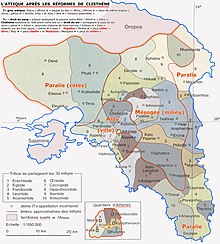Antiochis (tribu)

An Antiochis (Plantilya:Ἀντιοχίς) saro sa sampolong tribu (phylai) na kun saen an mga Suanoy na mga Athenian binabaranga;.[1][2]
Lokasyon asin historya
[baguhon | baguhon an source]Ini ipinangaran ki Antiochus, aki ninda Heracles asin Meda (aking babae ni Phylas, hade nin Ephyra).[3][4]
An Antiochis binibilog nin 13 demes: Aigilia, Alopeke, Amphitrope, Anaphlystos, Atene, Besa, Eitea, Eroiadai, Kolonai, Krioa, Pallene, Semachidai, and Thorai.[5][6][7][8]
An Phalerum sarong pantalan pagsasadiri kan tribu. Ha;e sa pantalan na ini an mga pagbyaheng-dagat ni Theseus asin ni Menestheus sinasabing igdi daa nagpoon, sa Crete asin Troy urog na.[9]
Si Socrates myembro igdi sa tribu.[10][11] An tribu iyo an may sadiri kan prytany sa Konseho, sa panahon na an mga pangyayari dapit sa sampolong heneral aktibo sa navy ka Athens duman sa batalya nin Arginusae.[11][12][13]
Si Aristeides iyo an may pugol sa hokbo kan tribu durante kan Batalya nin Marathon.[14]
Toltolan
[baguhon | baguhon an source]- ↑ E Vanderpool - Studies in Attic Epigraphy, History, and Topography: Presented to Eugene Vanderpool (p.170) ASCSA, 1982 ISBN 0-87661-519-1 [Retrieved 2015-04-17]
- ↑ NF. Jones - Ionian tribes DOI: 10.1002/9781444338386.wbeah04146 Published Online: 26 OCT 2012 The Encyclopedia of Ancient History[Retrieved 2015-04-17](ed. for nature of word < phylai >)
- ↑ N Fikri Alican - Rethinking Plato: A Cartesian Quest for the Real Plato (p.331) Rodopi, 2012 ISBN 94-012-0812-3 [Retrieved 2015-04-17]
- ↑ R Hunter (Regius Professor of Greek at the University of Cambridge c.2005) - The Hesiodic Catalogue of Women: Constructions and Reconstructions (p.191) Cambridge University Press, 14 Jul 2005 (reprint) ISBN 978-0-521-83684-5, 349 pages [Retrieved 2015-04-17]
- ↑ Papazarkadas, Nikolaos (2011). Sacred and Public Land in Ancient Athens. OUP Oxford. p. 295. ISBN 978-0-19-969400-6.
- ↑ John S. Traill The Political Organization of Attica: A Study of the Demes, Trittyes, and Phylai, and Their Representation in the Athenian Council, Volumes 14-16 (p.13) ASCSA, 1975 ISBN 0-87661-514-0 [Retrieved 2015-04-17]
- ↑ O Palagia, A Spetsieri-Choremi - The Panathenaic Games: Proceedings of an International Conference held at the University of Athens, May 11-12, 2004 (p.77) Oxbow Books, 26 Feb 2015 ISBN 1-78297-985-9 [Retrieved 2015-04-17]
- ↑ John S. Traill - (same source as given previously here)[Retrieved 2015-04-17]
- ↑ J Robinson (D.D., Rector of Clifton, Westmoreland.) - Archaeologia Graeca, or the Antiquities of Greece; chiefly designed to illustrate the Greek Classics. To which are prefixed, a brief history of the Grecian States, and biographical sketches of the principal Greek writers 1827 [Retrieved 2015-04-17]
- ↑ Nails, D - "Socrates" - A Chronology of the historical Socrates in the context of Athenian history and the dramatic dates of Plato's dialogues The Stanford Encyclopedia of Philosophy (Spring 2014 Edition), Edward N. Zalta (ed.)[Retrieved 2015-04-17]
- ↑ 11.0 11.1 Plato (2015). "Apology". In PL Miller; CDC Reeve. Introductory Readings in Ancient Greek and Roman Philosophy. Translated by Reeve. Hackett Publishing. p. 72. ISBN 978-1-62466-354-3. Retrieved 2015-04-17.
- ↑ Oxford Dictionary - prytany Oxford University Press [Retrieved 2015-04-17]
- ↑ M Dillon, L Garland (lecturer in Classics and Ancient History at the University of New England, New South Wales) - Ancient Greece: Social and Historical Documents from Archaic Times to the Death of Alexander (p.119) Routledge, 18 Jun 2010 ISBN 1-136-99138-7 (revised) [Retrieved 2015-04-17]
- ↑ N Sekunda (Ph.D 1981, taught at the Institute of Archaeology and Ethnology in Torun, Poland c.2002) - 490 BC: The First Persian Invasion of Greece (p.53) Archived 2016-03-06 at the Wayback Machine. Osprey Publishing, 2002 ISBN 1-84176-000-5 [Retrieved 2015-04-17]
